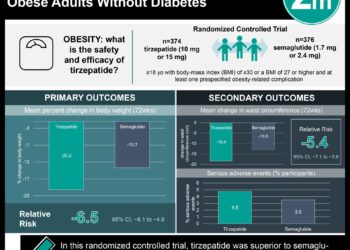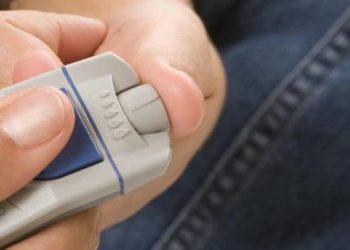Intermittent vagal nerve block ineffective for weight loss in obesity
1. In patients with morbid obesity, intermittent intra-abdominal vagal nerve blockade did not induce significant body weight loss (>20%) when compared to a placebo device.
2. While the safety profile of the device itself was low, adverse events associated with abdominal surgery and anesthesia persist.
Evidence Rating Level: 1 (Excellent)
Study Rundown: The vagus nerve interacts with the gastrointestinal track to influence dietary intake through multiple mechanisms. This study sought to provide an alternative to current bariatric surgeries for the treatment of morbid obesity. Results showed that while intermittent intra-abdominal vagal nerve blockade resulted in more weight loss than the placebo device, this weight loss did not meet the study’s predefined criteria for significant excess body weight loss (excess weight loss >20%) when compared to a placebo device.
The strengths of this study include the strict design with regards to the outlined efficacy and safety objectives, as well as the randomization and blinding utilized given the invasive nature of the investigated intervention. Limitations of the study include the small percentage of study participants with type II diabetes. Given the potential for associated confounding factors, it is understandable why the authors decided to limit the number of diabetic participants in the study. However, since a large percentage (>10%) of patients with morbid obesity have type II diabetes, this exclusion hinders the generalization of these results to the population at large. Keeping these limitations in mind, this study suggests that intermittent intra-abdominal vagal nerve block does not produce significantly superior results (>10% difference in weight loss from controls) when compared to placebo therapy.
Click to read the study, published today in JAMA
Click to read the accompanying editorial, published today in JAMA
Relevant Reading: Bariatric surgery versus non-surgical treatment for obesity: a systemic review and meta-analysis of randomised controlled trials
In-Depth [randomized controlled trial]: This multicenter study enrolled 239 participants with a body max index (BMI) between 35-45 and at least one co-morbidity related to obesity, and randomized them to receive either an active vagal nerve block device or a placebo device. The primary objectives regarding device efficacy were to 1) assess the mean percent of excess weight loss between the two groups and 2) for 55% of patients in the experimental group to achieve 20% excess weight loss and for 45% to achieve at least 25% excess weight loss. Results showed that the mean percentage of excess weight loss was 24.4% in the active device group and 15.9% in the placebo device group, with a mean difference of 8.5% (95%CI, 3.1-13.9). Fifty-two percent of participants achieved the 20% excess weight loss mark, and only 38% achieved 25% excess weight loss. Consequently, neither of these two primary endpoints for device efficacy was achieved.
The primary objective regarding device safety was to demonstrate an adverse event rate of <15%. This objective was met, with only 3.7% of participants reporting an adverse event related to the device, and 8.6% of participants reporting an adverse event when adverse events related to surgery and anesthesia were included. The most common adverse effects related to the device were nausea, heartburn, and pain at the implantation site.
More from this author: The CLARITY trial: Adding clopidogrel to STEMI management [Classics Series], Aspirin vs warfarin in atherosclerotic intracranial stenosis [Classics Series], The ARISTOTLE trial: Apixaban vs warfarin in atrial fibrillation [Classics Series], The TRITON trial: Prasugrel vs clopidogrel in ACS [Classics Series], Vena caval filters in pulmonary embolism prophylaxis [Classics Series]
Image: PD
©2012-2014 2minutemedicine.com. All rights reserved. No works may be reproduced without expressed written consent from 2minutemedicine.com. Disclaimer: We present factual information directly from peer reviewed medical journals. No post should be construed as medical advice and is not intended as such by the authors, editors, staff or by 2minutemedicine.com. PLEASE SEE A HEALTHCARE PROVIDER IN YOUR AREA IF YOU SEEK MEDICAL ADVICE OF ANY SORT.







![Radiofrequency catheter ablation effective as first-line therapy for atrial fibrillation [RAAFT-2 trial]](https://www.2minutemedicine.com/wp-content/uploads/2014/02/afib_-75x75.jpg)